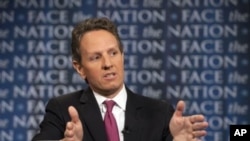President Barack Obama Sunday is meeting again with U.S. congressional leaders in search of an elusive deal to slash the federal deficit and avoid default on America’s $14.3 trillion national debt. Negotiations reconvene one day after the top Republican lawmaker suggested an ambitious effort to trim future indebtedness by more than $4 trillion may be unworkable.
Late Saturday, House Speaker John Boehner confirmed what seemed obvious to many observers: negotiations over America’s runaway debt burden are at an impasse. At issue: whether a long-term deficit reduction deal should include additional revenue, or rely on federal spending cuts alone.
Boehner noted the White House’s insistence that tax hikes be included in a final package - a position rejected by Republicans. Given the disagreement, the speaker suggested aiming for a more modest deal based on spending cuts already identified in negotiations to date. Those spending cuts would form the basis for raising the federal borrowing limit, which the Obama administration says must be done by August 2 if the U.S. government is to remain solvent.
But administration officials insist a so-called “grand bargain” is still possible. Treasury Secretary Timothy Geithner appeared on CBS’ Face the Nation television program.
“There has to be a deal. Failure is not an option,” he said.
President Obama’s Chief of Staff, Bill Daley, says the bigger the deal, the better off the nation will be.
“Four trillion dollars is the number that will make a serious dent on our deficit. It will send a statement to the world that the U.S. has gotten hold of their [its] fiscal problems," said Daley. "And it will give confidence to the American people that we can move forward to bring economic soundness.”
Daley spoke on ABC’s This Week program. The administration has long maintained it would consider painful spending cuts to federal programs long-championed by Democrats, as well as reforms to so-called entitlement programs that provide income and medical insurance for retirees, if Republicans would agree to end tax breaks for the wealthy and certain corporate interests.
Republicans reject any tax hikes unless overall tax rates are reduced, thereby making tax changes revenue-neutral. Senate Minority Leader Mitch McConnell appeared on Fox News Sunday.
“Everything they [administration officials] have told me and the speaker [John Boehner] is that, to get a big package, it would require big tax increases in the middle of an economic situation that is extraordinarily difficult with 9.2-percent unemployment," he said. "We [Republicans] think that is a terrible idea. It is a job-killer.”
As a general principle, few, if any, economists advocate higher taxes as a cure for economic weakness. But there is disagreement among economists on whether government spending should be slashed to trim the deficit at a time of low private sector demand for goods and services. On one point there is no disagreement: America’s debt burden is unsustainable and, if left unchecked, will bankrupt the nation.
US Debt Negotiations Stumble Over Taxes




